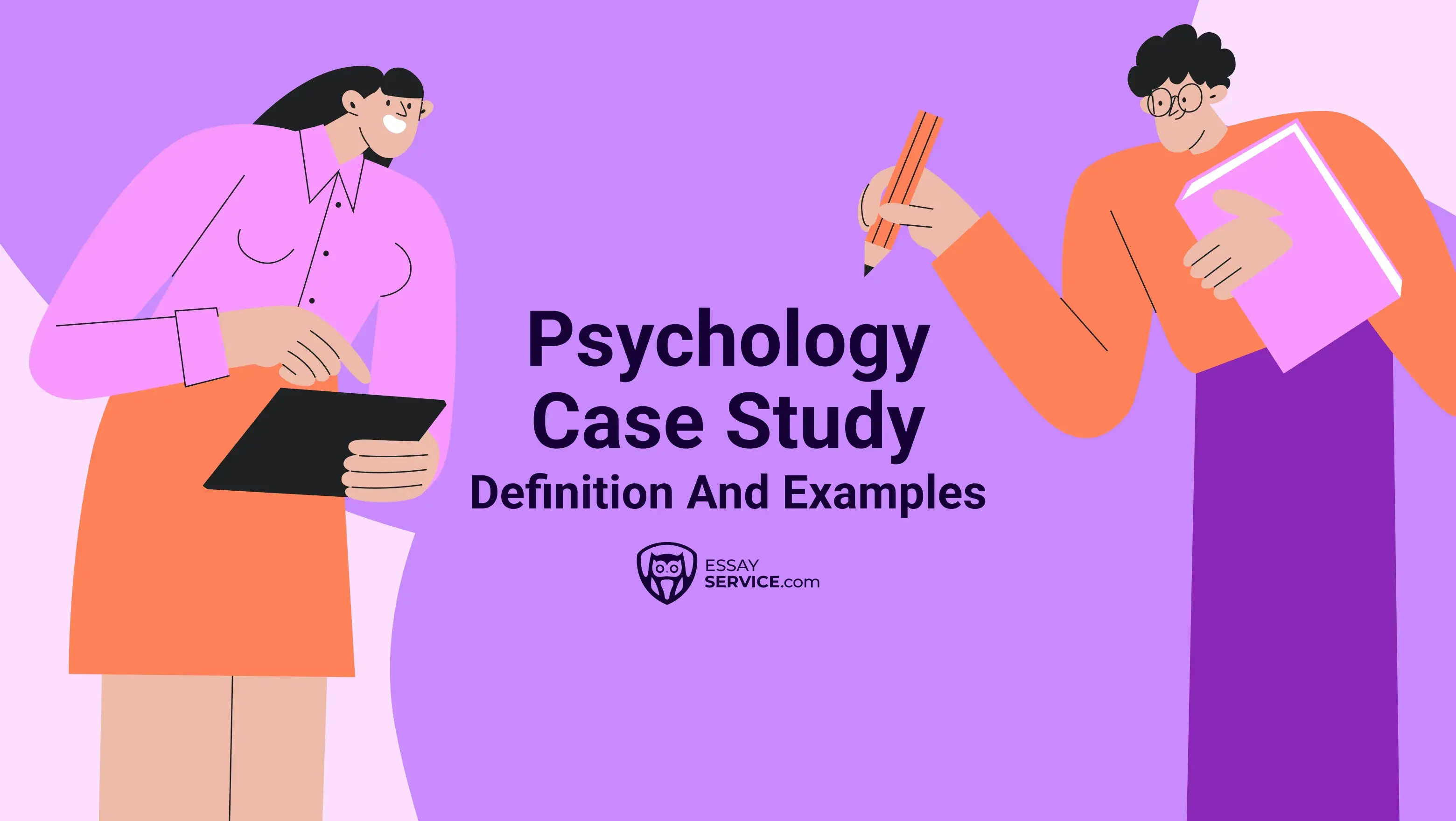A case study in psychology is a detailed investigation of one individual, group, or event. Its goal is to learn psychological patterns and behaviors and study how they influence outcomes. Psychologists gather qualitative and quantitative data to understand how the human mind works in real world examples.
This article will teach you what a case study is and how it sets direction for further research. If you have a project like this due and are not sure where to start, EssayService's case study writing service can take some of the pressure off your shoulders.

What Is a Case Study in Psychology?
The definition of case study in psychology centers on a structured approach to understanding one subject or a small group in depth. Researchers spend time observing behavior and experiences, later linking these details to psychological theory. They might rely on interviews, test results, and background analysis to build a complete picture of the subject's mental health.
Each layer of evidence in this form of study builds toward a deeper understanding of thought and behavior. By tracing unique cases, psychologists often reveal insights that large-scale studies overlook and create the groundwork for new directions in future research. For example, many existing theories, including cognitive behavioral therapy, grew from insights first discovered in case studies.
Importance of Case Study in Psychology
Case studies matter in psychology because they reach beyond the general trends. They don't stop at statistics or tidy summaries. They dig into the messy details that show how people actually think and feel. A single case can eventually cause a change in understanding, sometimes even rewriting what was once considered fact or fueling future research. Psychologists can track symptoms through these detailed studies and see how treatment methods play out over days or years. For students, they're a reminder that theory only makes sense when tested against real-life experiences.
Types of Case Study in Psychology
Psychologists conduct various types of case studies, depending on what they aim to accomplish. Each category contributes differently, but all share the same goal: to understand the human mind. Here are some of the most common types:
- Descriptive Case Studies – Records what's observed as it happens, keeping details clear and factual without interference.
- Exploratory Case Studies – Opens the door to new research questions and early ideas when the topic is still unfamiliar.
- Explanatory Case Studies – Tracks cause and effect, uncovering why certain behaviors or outcomes appear.
- Intrinsic Case Studies – Looks closely at one subject chosen for its uniqueness or personal significance.
- Instrumental Case Studies – Uses one example to shed light on a wider theory or recurring pattern.
- Collective Case Studies – Brings together several related cases to reveal broader connections and themes.
Benefits and Limitations of Case Studies in Psychology
The clear objectives of case study in psychology are to try to understand the depth of human experience: how thoughts and emotions form, and how human behavior adapts in real situations. Still, the method has two sides. Its strength lies in detail. Its weakness is in scope. Knowing both helps researchers use it with intention.
Benefits:
- Offers layered data that shows how psychological theories unfold in daily life.
- Brings attention to rare cases or unusual conditions that big studies miss.
- Sparks new relevant psychological theories by showing unexpected links and hidden patterns.
- Encourages a wide view, connects psychological processes with biological and social influences.
Limitations:
- Works with small groups, which makes findings harder to generalize.
- Can tilt toward bias when interpretation leans too heavily on one researcher's lens.
- Demands time, patience, and resources to gather meaningful data.
- Depends on context, which makes repeating results tricky.
Data Sources for Psychology Case Studies
No single source can tell a full story. Researchers mix broader research methods and observations until the picture feels whole. Woven together, these research data sources give us layered evidence.
- Interviews – Reveal personal memories, thoughts, and reflections.
- Observations – Show real human behavior that might never appear in words.
- Psychological Tests and Assessments – Provide measurable traits and structured data.
- Medical and School Records – Trace early development and background patterns.
- Personal Journals or Diaries – Show thoughts and emotional shifts over time.
- Third-Party Reports – Offer outside perspectives from family, teachers, or peers.
Psychology Case Study Examples
The case study method in psychology helps researchers understand real situations to propose interventions or find new ideas for future research. The examples below show how individual challenges can lead to practical solutions for improving research subjects' mental health.
Wrapping Your Mind Around It
Case studies remind us that psychology starts with a single story. Not data points or charts. People. Each one gives shape to psychological theories that might've otherwise stayed abstract. When a researcher spends time inside one person's world, patterns begin to surface: how habits form, how memory bends, how healing slowly takes root. That's the real power behind the method.
When the writing part feels tangled, EssayService is there to help. With our service, you can get thoughtful guidance and feedback while you learn how to create a case study.
Frequently Asked Questions
What Is the Purpose of a Case Study in Psychology?
The purpose of a case study in psychology is to conduct a detailed investigation of a person's thoughts, emotions, and behavior. Psychologists collect information about the subject and build a full picture of how a particular individual thinks and responds. Insights gained from one case can refine existing theories and lay the groundwork for future research.
Why Is Case Study Important in Psychology?
A case study is important because it shows patterns that large-scale research data can miss. Observing one individual closely allows psychologists to see how different experiences shape perception and behavior. These findings often link back to previous research and help confirm or question what's already known.
What Is an Example of a Case Study in Psychology?
An example might follow a young adult with severe test anxiety using a cognitive behavioral approach to manage stress. Through a very detailed investigation, the psychologist tracks progress and thinking patterns, linking results to existing theories, previous research, and better long-term mental health strategies.

Susan shapes the new generation of nursing professionals as a professor. Her medical degree and teaching experience make for a wealth of advice on researching and writing complex papers.
- Martin, R., & Hull, R. (2006). The Case Study Perspective on Psychological Research. Critical Thinking in Psychology, 90–109. https://www.cambridge.org/core/books/abs/critical-thinking-in-psychology/case-study-perspective-on-psychological-research/1D6B88AB0FCF8690C293DECCD3EAE1A2
- Crowe, S., Cresswell, K., Robertson, A., Huby, G., Avery, A., & Sheikh, A. (2011). The case study approach. BMC Medical Research Methodology, 11(1), 1–9. NCBI. https://bmcmedresmethodol.biomedcentral.com/articles/10.1186/1471-2288-11-100
- Case studies | BPS - British Psychological Society. (n.d.). https://explore.bps.org.uk/. https://explore.bps.org.uk/content/report-guideline/bpsrep.2020.rep144/back-matter/bpsrep.2020.rep144.10
New posts to your inbox
Your submission has been received!



